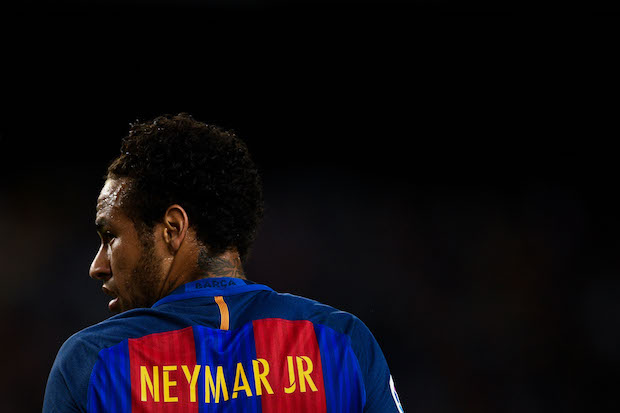A season ticket at the Parc des Princes, home to Paris Saint-Germain, will set you back somewhere between £336 and £2,116, with individual tickets ranging from £25 to over £100, depending on how good your eyesight is. But this is a small price to pay in order to watch footballing luminaries like Edinson Cavani, Ángel di María and Dani Alves light up a league that has long been the sickly cousin of the European superpowers. Indeed, if you’re a PSG fan, this cost will be nothing compared to the phenomenal resurrection, started in 2011, of a European superpower that appeared to be in terminal decline.
PSG are on the verge of obliterating (and I don’t use that word lightly) the world transfer record in order to sign Barcelona striker Neymar for £198m, a cool £108.7m more than the previous record (Paul Pogba for Manchester United). A 10 per cent slice of that fee will go to Neymar’s father – also his agent – who is the sort of helicopter parent who can afford a helicopter.
The natural instinct is, of course, to point to this as the death of football. That reaction is compounded by the fact that PSG are owned by the Qatar Sports Investment group, a branch of the Qatari government. They describe their mission as ‘To invest in established and emerging sport… We want to create great value for our customers, the general public and our stakeholders.’ So, naturally, to prove great value for the Qatari people, they bought a football club in Paris and ploughed money into it. But the Qatari football project is actually slightly more nuanced: hosting the 2022 World Cup has forced them into Gatsbyesque spending on infrastructure and grassroots development. As a result, the national team continue to improve, beating South Korea back in June.
It is also easy to see the acquisition of Neymar as an attempt by Qatar to assert itself on the world stage, in the midst of a crisis in the Gulf. Sport has long been used as a form of soft power, and it seems to be du jour amongst the countries of the Arabian peninsula. Spending almost £200m on a single 25-year-old human is certainly a statement of sorts, especially when your neighbours have issued commercial sanctions against you. But in international terms, £200m isn’t that much to pay for a dead cat diversion more compelling than Garfield’s funeral. After all, for that price you’d only get a few miles of HS2, a Land Rover factory in Warwickshire, or Len Blavatnik’s house in Kensington. The price is really only so shocking because it’s unprecedented.
Even though there’s something of the ‘gold-plated Lamborghini illegally parked outside Harrods’ about the Neymar deal, it has excited football fans across the globe. And PSG are hardly alone in their theatricality. Manchester City (and their owners, the UAE royal family) have dropped a cool £220m so far this window, whilst their Old Trafford neighbours have spent £145m on just three players. Even the annual bait-and-switch of Arsenal’s transfer policy is custom built to get tongues wagging across North London and beyond. And if you thought that the Qatari government or Emirati monarchy were unlikely football club owners, Michael Eisner, billionaire CEO of Disney, has just bought Portsmouth. The frisson of revulsion we feel at these deals elicits the same sensations experienced when we see a sickening tackle or a fight in the stands or a shock managerial sacking: distaste, curiosity, excitement.
Whether Neymar costs £198m or £19.8m or even £1.98bn is of little consequence to anyone other than Neymar, his father, and maybe his infant son. Ticket prices are driven by demand, not by transfer spending (otherwise my West Ham season ticket would be a snip), and so long as that remains the case – and the people of Qatar aren’t gripped by famine – we should see these fees for what they are: a form of corporate theatre, where the Monopoly money figures are just a temporary diversion from the performances on the pitch.







Comments